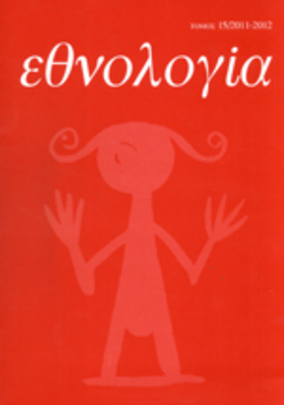Αστική λαογραφία : ουτοπία ή πραγματικότητα;
Part of : Εθνολογία : περιοδική έκδοση της Ελληνικής Εταιρείας Εθνολογίας ; Vol.3, No.1, 1994, pages 163-188
Issue:
Pages:
163-188
Parallel Title:
Urban folklore science : utopia or reality?
Author:
Abstract:
What we call a “folk” experience is not something archaelogically bound to tradition; it may well be something existing in contemporary societies.As early as in 1963 Loukatos, in his “Folklorica Contemporanea”, points out the transition to contemporary forms of social organization. While stressing the changes taking place, he speaks of e new folklore science which he calls Contemporary or Urban Folklore Science, the latter term referring to an area that should be the focus of the research not only of folklorists but of scientists in the Humanities in general.In the case of Greece, and owing to its irregular economic development, “urban region” meant only Athens. There were developed in that way two poles, two worlds one to opposition to other. While being a product of the urban region, folklore science considered its field to the rural region so as it could search for evidence of “continuity”. For that reason its view of the rural region was to a large extent self-centred and “folklorist”.The rural region was considered to be the only “produced” of popular culture. The features of a folk phenomenon (communal, spontaneous, according to tradition) became a fetish for the folklorists. Owing to that, as Damianakos argues, there were ignored forms of popular cultures such as Karagiosis. It is not coincidental that the urban region was ignored by many folklorists e. g. Megas.A basic axiom for the folklorists of that period was the following: rural culture, a popular culture, is superior to that of the urban region. However, quite soon there appeared a vacuum in the academic research.At that same period (beginning of twentieth century) the urban region witnesses phenomena of a strong folk character such as the revue, a form of popular entertainment. In the big urban centres of the time there lives a population that is active; at the same time the settling of a large rural population in them creates neighbourhoods. The fundamental changes that take place in Greece after the end of the second World War disrupt the relation between urban and rural regions.At that moment Loukatos sees that for the folklore science to extend its field to a people which is no longer the same, there must change the definition of the terms “people” and “popular culture”.Other folklorists such as Meraklis and Kyriakidou look for the “people” not only in rural regions but also in their new settlements. Homo Urbanus is a new reality for them. Meraklis studies him, identidies his characteristics, defines him as a multi - level and multi - class concept.
Subject:
Subject (LC):




